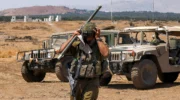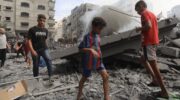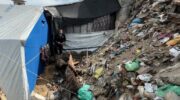For years, Israeli troops have laid waste to Gaza’s farmland, using bulldozers, tanks, and toxic chemicals amid a dire economic situation.
By Abdallah al-Naami, reposted from The Electronic Intifada
Yousif Shaheen went to harvest his eggplant crops early on 13 October. His farm – near the city of Khan Younis – is located a few hundred meters from the fence separating Gaza and Israel.
Suddenly, the farmers noticed that Israeli soldiers were driving three bulldozers toward them.
“We shouted at the bulldozers,” Shaheen said. “But they did not stop.”
The Israeli troops bulldozed about 2.5 acres of Shaheen’s land. His entire crop of eggplants and his irrigation systems were destroyed.
Shaheen believes that the Israeli troops planned the attack to cause major harm to farmers’ livelihoods.
“They waited until the eggplants were ready to be harvested,” he said. “I was heartbroken seeing my land and my crops obliterated.”
At least 10 farmers incurred substantial losses because of the attack. The estimated total cost of the damage was approximately $32,000.
Pattern of terror
The 13 October incident was one of Israel’s worst attacks on Gaza farmers over the past few years.
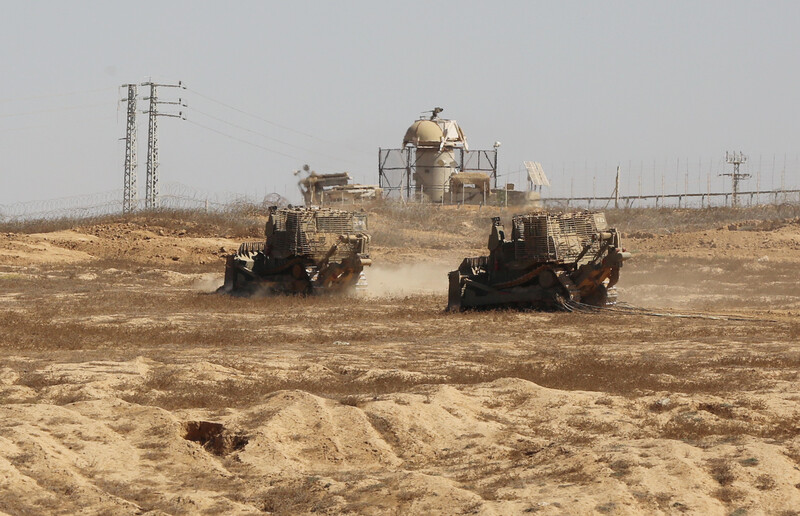
Two days later, Israel inflicted terror on Gaza’s farmers once again.
Ali Abu Said and 12 other farmers were working close to the village of Johr al-Deek on the morning of 15 October. They were around 300 meters from the boundary fence when they noticed a bulldozer and another military vehicle approaching them and Israeli troops shooting in their direction.
“We started waving pipes [from the irrigation system] and buckets to show that we are just farmers,” Abu Said said. “But the soldiers kept firing bullets and tear gas canisters at us. So we all got on a tractor and drove as far away as we could.”
On 18 October, Israeli forces again entered Gaza, destroying some farmland and irrigation systems east of Khan Younis.
Israel sought to defend that incursion by claiming its purpose was to destroy tunnels dug by Palestinian armed groups. Yet human rights groups contend that Israel has no justification for attacking Palestinian farmers and the land on which they work.
Israel’s destruction of civilian property violates international law.
Although Israel evacuated its army from Gaza in 2005, the military occupation has continued.
The forces of occupation are stationed on the periphery, but that does not mean they leave Gaza’s inhabitants alone. For years, Israeli troops have laid waste to Gaza’s farmland, using bulldozers, tanks, and toxic chemicals.
OCHA, a United Nations monitoring agency, has calculated that there have been more than 40 Israeli military incursions into Gaza this year.
In January, Israel sprayed herbicides on Gaza’s farms, harming an area covering 495 acres. A similar attack occurred in April when Israel used such chemicals to damage 145 acres of land.
“My land is my livelihood.”
Mustafa Abu Odeh grows wheat near Beit Lahiya in northern Gaza. Israel sprayed herbicides on his crops at least five times during 2019.
“I had to dredge the whole field and plant the wheat again,” he said.
He is worried that Israel may strike again. “We have planted our wheat for this year,” he added. “The thought that we might have to uproot it and replant is heartbreaking.”
Between 2017 and last year, Israeli troops carried out ground invasions of Gaza a total of 225 times.
Riyad al-Nisr – now aged 60 – was shot by Israeli troops both in 2017 and 2018. He has a permanent injury in his right wrist that limits his hand’s use, and he had to have two toes amputated from one of his feet as a result.
Despite his injuries, al-Nisr still works on a farm located near the Bureij refugee camp. He is trying to support 17 members of his family.
“I have been working in agriculture for 42 years,” he said. “It was my grandfather’s profession, and now it is my sons’ profession. My land is my livelihood.”
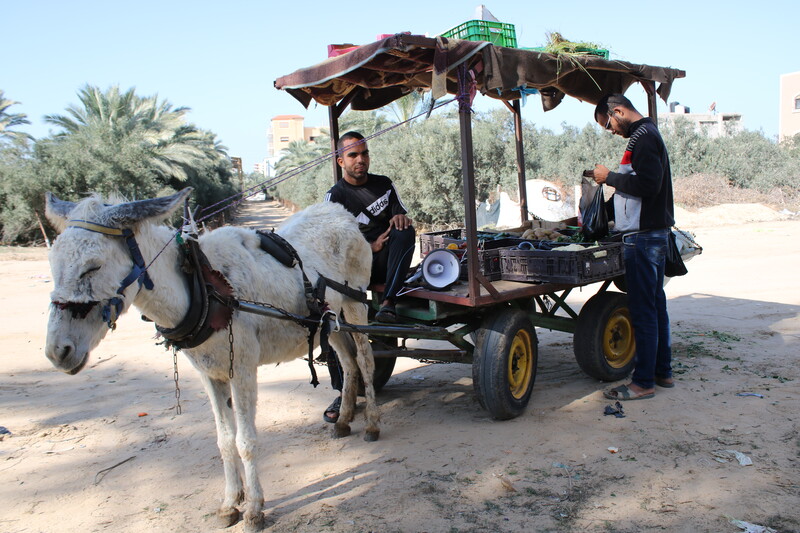
Israel’s attacks have taken place amid a dire economic situation.
The siege which Israel has imposed on Gaza for the past 13 years has meant that farmers can only export a fraction of their produce. Seeds and agricultural equipment have become scarce and expensive because Israel has restricted numerous restrictions on imports.
Sales opportunities for farmers have narrowed further this year amid the COVID-19 pandemic. Local markets have often been closed by the authorities.
To try and make ends meet, Mahmoud Abu Shawish has lately tried to sell food from his farm by hauling it around the Maghazi refugee camp in central Gaza.
Every day he loads an animal-drawn cart with fruit and vegetables. He uses a loudspeaker to try and drum up business.
“I am selling my crops at the lowest prices,” he said. “That’s the only way I can try to compensate for the losses I have made since the pandemic began. It has turned us into street vendors.”
Abdallah al-Naami is a journalist and photographer living in Gaza.
RELATED READING:
- No, life during the coronavirus isn’t like Gaza
- Gaza families suffer under 13+ years of Israeli imposed ‘quarantine’
- Facts & latest news on Gaza Great March of Return
- International flotillas attempt to take humanitarian supplies to Gaza
- Freedom Sailors: The Maiden Voyage of the Free Gaza movement and how we succeeded in spite of ourselves.
- Understanding the Crisis in Gaza



